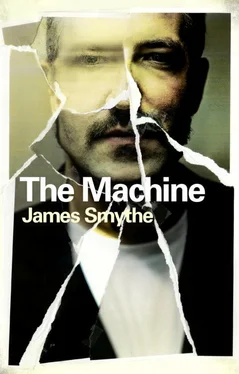Memory is the greatest gallery in the world and I can play an endless archive of images.
J.G. Ballard,
Miracles of Life
She opens the door to a deliveryman, and the Machine, which has come in three parts, all wrapped in thick paper. Each of the parts is too big to get through the door.
We’ll have to try the window, the man says.
She shows him which one it is, along the communal balcony. It’s already at its widest, to let some air into the flat, to try and counteract the invasive heat from outside. Still not wide enough, so the men – the first has been joined by another from the van, having just heaved another thick cream-paper wrapped packet the size of a kitchen appliance from the van, and left it leaning against the bollards – tell her that they’ll have to take the window out.
We’ve got the tools for it, this other man says.
Beth stands back and watches as they unscrew the bolts on the attaching arms, and then lift the whole sheet down. Others in the estate have stuck their heads out of their windows, or come out of their front doors to watch. Next door, the woman with all the daughters stands and watches, and her girls run around inside. The littlest one stands at the woman’s legs, clutching onto her skirt.
Gawpers, the first man says. Always wanting to know what we’re up to.
The deliverymen don’t know what’s inside the packages. They’re just paid to deliver them. Beth wonders if she’s going to be able to assemble it herself, or if she’s better off asking them for help. Slip them a fifty, they’d probably stand around with her for an hour and figure it out. She doesn’t know how easy it will actually be: if there will be wires, or if it’s just a case of plugging the pieces together. The man she bought it from said it would be simple. They struggle up the stairwell with the first piece, stopping to mop their brows. They still wear dark-blue overalls, in this weather, and their now-sweaty palms leave dark-brown prints on the paper wrapped around the Machine’s pieces. The first piece makes it through the window maw, twisted in the frame as if this is one of those logic games. Manipulate the pieces.
Right, the first man says. Where do you want them?
In the spare bedroom, Beth tells him. She indicates it through, pointing the way past the living room. The room is light and airy – or as airy as it can be nowadays – and decorated like it’s a master, with an expensive-looking bed. Wallpaper not paint, with a different dado rail, a thick yellow colour contrasting with the impressed patterned cream of the walls. The room looks untouched, like nobody’s ever lived in it. The bed is made, the sides of the duvet tucked in below the mattress. There’s potpourri on the dresser in a simple golden metal dish, but not enough to stop the faint smell of dust. The sunlight, through the window, hits the dust, a cone of it floating in the air.
Anywhere?
By the back wall. I’ve cleared a space for it. She rushes past, ducking down in front of him, making sure that the space is still clear, then helps him lower the first package.
What the bloody hell is this thing? the man asks.
Exercise equipment, Beth tells him. That’s an answer suggested by the man who sold the Machine to her. In his email, he told her that he would write that on the form for the collection, and on the customs form. He was French, and Beth had had to translate his email using the internet, only the occasional word making her stumble. Still, she got the gist.
Jesus, the deliveryman says as he puts it down – the French seller has marked the packages with arrows, showing which way up they’re to be carried and stored – and stretches his back. He’s wearing a thick black harness around his waist, which he pats. Lifesaver, he says. They make us wear them now, for the insurance. We take them off in the van, when we’re done. Fucking hot though, wearing this along with the rest of the get-up. He stretches again, more exaggerated this time. His friend shouts from the window, where they see he’s positioned the next piece – this one long and thin at one end, bulbous and clunky at the other, meant to stand tall, taller than any of the people in the flat – halfway through the window. He’s straining to hold it up. Beth sees that the arrows (marked with thin, shaky writing that says THIS WAY UP) are horizontal. She wonders if that’ll affect it in any way.
Come on, the man says, can’t hold it. The other one takes the inside end and they work it through.
Same place? the first removal man asks. Beth nods, and then he asks for something cold to drink, which she prepares – iced tea, in the fridge – as they both struggle with it through the tight doorways and narrow corner into the room. She’s got two glasses on the side ready by the time that they’re done with that piece, but the first man – clearly the superior of the two, older and wiser and with a company t-shirt on under his rote blue overalls – waves them aside. Last piece, then we’ll have them, he says. Beth watches them both at the van, which they’ve parked at the bottom of the estate, by the bollards that prevent cars driving right up to the buildings themselves. They look at the last piece, which is nearly the same shape as the first, only somehow wider, more unwieldy, and they both laugh. She knows that they’re talking about what it is. Speculating. They’ll know it’s not exercise equipment. They’ve handled exercise bikes before. They do this for a living, and the wool can’t be pulled over the eyes of those who will know the weight and shape of an exercise bike or a rowing machine. She watches as they finally heave the last piece up between them, up the stairwell and into her flat through the window space. Their sweat drips from their heads and onto the concrete slabs, and the Machine.
It needs to be a certain way, she says. Would you mind? They shrug, and she tells them. The pieces have been labelled with numbers showing where they connect, drawn on the outside of the wrapping.
This is like Tetris, the first man says. The younger man laughs. They back up and look at it when they’re done, and the wall is essentially filled by the wrapped packages. The light that came through the small window is totally blocked now, and the room is suddenly darker, thrown into the shade of the still-wrapped packages. You all right with this now? the older man asks. He hands Beth a sheet from his back pocket, and a pen. Sign this and we’re all good. They gulp their drinks back as she signs her name three times, and then leave the glasses on the side. They replace the window back in minutes. These things are all designed to be taken apart and put back together so quickly now, the first man says. Everything’s a bloody prefab, right? He smiles at Beth as if she doesn’t live here, as if she’ll be in on the slightly snobbish joke with him. To her surprise she laughs, to back him up.
I know, she says. Thanks for everything. I really mean that.
No problem. She waits until they’re back in their van – they stand at the rear of it for a few minutes examining what they’ve got left on their sheet of deliveries, and where they’re heading next, wiping their foreheads on their sleeves and on a towel, gasping for air – and then watches them drive away. Then it’s just her and the flat and the Machine.
The paper pulls away from the Machine with relative ease. She’s surprised that it didn’t tear during the move. A few bits she has to attack with scissors but most of it rips away easily, and then she’s left with the Machine itself. She stands back, on the other side of the bed, against the far wall. She sizes it up. This one is bigger than she remembers.
Читать дальше
Конец ознакомительного отрывка
Купить книгу










